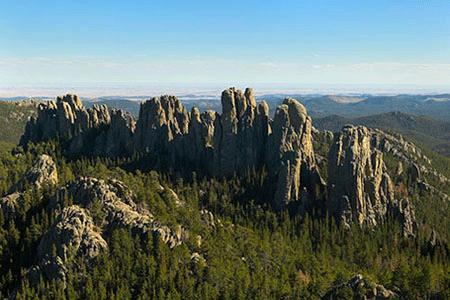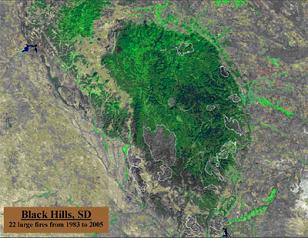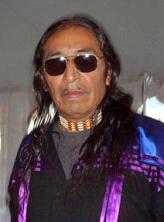The Black Hills Are Everything!
David Swallow, Jr., Wowitan Yuha Mani
Traditional Lakota Spiritual Leader and a Head Man of the Lakota Nation.

The white man calls me David Swallow, Jr. but my real name is Wowitan Yuha Mani. I am a TetohLakota of the Wa Naweg’a Band and I live on the Pine Ridge Indian Reservation in South Dakota.
This is the way my Grandpa Najutala told me, a long time ago. He was a teenager when the 1868 Treaty was signed. He’s gone now but this is how he told me about the sacred Black Hills.
The Black Hills used to be occupied by the Crow Tribe. That was way back, like in the 1700’s, even the 1600’s. Then, the Black Hills were taken by the Shahiyela (the Cheyenne). Then, the Lakota took them from the Cheyenne. Finally, the white man took them from the Lakota.
The Lakota look at the Black Hills as having spiritual power. All the Plains Tribes look at them that way. But the white man saw only the yellow rock called gold. They tried to make deals to get the land in the Treaties of 1825, 1851, 1868, and even the Bradley Bill of the 1980’s.
However, the only Treaty that should be recognized concerning the Black Hills is the Treaty of 1851. At that time, all the tribes signed this Treaty and they signed it in a holy way. The Lakota brought the Sacred White Buffalo Calf C’anunpa, the Cheyenne brought their 7 sacred arrows, and the Crow, Arikara, and other tribes brought their sacred bundles.
They all held ceremonies before they held the pen. They all agreed that no settlers should enter that sacred area, the Black Hills. The way that Treaty was written, this became a non-negotiable matter from that time on. No other Treaty would have the right to change that.

But the government and homesteaders, the settlers and prospectors kept invading the Black Hills.
As a result, the Federal Government renegotiated the terms and called it the Fort Laramie 1868 Treaty. This time, the original signers of the 1851 Treaty didn’t want to sign. Many were fighting. There were no sacred ceremonies done and only one sacred c’anunpa, only one sacred prayer pipe, was present.
The prospectors and homesteaders brought in whiskey to get many of the signers drunk so they would sign. My grandfather told me all about this. He saw it, personally. Mni wakan, sacred water, is what the Lakota called alcohol because it affected our people so strongly.
So this is how we lost the Black Hills.
Six years later, in 1874, General George Armstrong Custer took an expedition into the Black Hills which included a geologist and numerous miners. What they found immediately caused a major gold rush and the white settlers and miners began pouring into the Black Hills. The treaties were completely ignored.
In 1876, the Indian Appropriations Act demanded the Sioux give back the Black Hills or starve under siege. Then they ordered the destruction of all the buffalo herds. By 1889, the Federal Government had forced the Lakota into prisoner of war camps which they now call Reservations. According to government documents, Pine Ridge Indian Reservation is prisoner of war camp #344.
Around 1990, I rode 7 years with many young people to the Crazy Horse Monument. When we crossed our so-called homelands, we were stopped by the white landowners because we didn’t have their permission. One old homesteader showed us his deed showing where he had bought the land from the Federal Government. He told us that if we didn’t like it, we should go talk to the Federal Government who got it from the Louisiana Purchase.
So, we lost our Black Hills. Some said we sold them. If so, I believe somebody took the money without any of us Lakota, Dakota, Nakota, Cheyenne or Arikara knowing it. There is no money.
In 1980, the United States Supreme Court said the Black Hills did rightfully belong to the Lakota. They wanted to buy them from us but our People have refused that money. The sacred Black Hills are not for sale.
But that’s why the Bradley Bill was introduced in 1987 in Congress, to make it look good. It supposedly would have let us live in the Black Hills while the Federal Government could still mine, trespass, and do whatever they wanted. But even that was never approved.
So, saying the Black Hills are ours and belong to us are just hollow, empty words. If they are really ours, why can’t we live there? It’s only occupied by white people with land deeds.
We cannot even go to the Black Hills and exercise our spiritual ways. We are forbidden. We have to get permission from the Government and the BLM and then we have to follow their rules and regulations. But if we are a sovereign nation like they said, we would have our own jurisdiction (county-state-reservation).
If we do still own the Black Hills, we need a new treaty, to renegotiate a new treaty. All the other treaties were violated or abandoned, often with the approval of Congress, without us knowing about it. That’s not supposed to happen in nation to nation dealings.
We have a treaty council, a council of elders, all kinds of councils but none of them are effective. The government and state have kept us hungry and distracted with their projects which accomplish very little.
Every other foreign nation conquered by the United States has received huge efforts towards rehabilitation and rebuilding. Yet, while the U.S. cries about 20% unemployment, we have 80% unemployment.

We remain isolated and have living conditions which are as bad as or worse than any “third world country.” Our life expectancy is only 48 years old for men and 52 years old for women.
We are the longest prisoners of war in the world’s history. It must change. We need to be set free so we can deal with our own people and our children and their children.
Unfortunately, most of our old people are in the spirit world. Today, our young people have no knowledge of the treaties, the massacre of Wounded Knee, the struggle of Wounded Knee 2, or our history. These are the reasons our culture is dying. No one remembers the language, culture, virtues, or spirituality. No one knows the real history.
But they need to know. If we are to survive, people need to understand. When we’re talking about the Black Hills, it’s not just the land that was lost but our way of life. It’s not just money. Money is the least important thing. We have lost our way of life.
When we talk about the Black Hills, it is about everything. That place is holy and sacred.
Ho he’cetu yelo, I have spoken these words.
David Swallow, Wowitan Yuha Mani
Porcupine, South Dakota – The Pine Ridge Indian Reservation
Edited by Stephanie M. Schwartz,
Member, Native American Journalists Association (NAJA)
Originally published at www.SilvrDrach.homestead.com/Schwartz_2009_Jul_05.html
This article may be reprinted, reproduced, and/or re-distributed unedited with proper attribution and sourcing for non-profit, educational, news, or archival purposes.
__________________________________________________________________________________
Source:
http://www.republicoflakotah.com/2009/the-black-hills-are-everything-by-david-swallow/
Photo:
http://www.bhacf.org/images/blackhills.gif
http://www.landfire.gov/images/blackhills.jpg
http://www.russellmeansfreedom.com/wp-content/uploads/2009/07/david_swallow_ft_collins_9-07_gc_4inch.jpg
























